

Stress: Why does it happen and how can we manage it? Stress is a natural feeling of not being able to cope with specific demands and events.
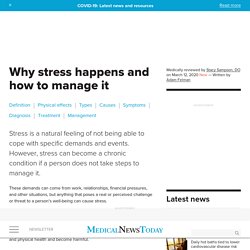
However, stress can become a chronic condition if a person does not take steps to manage it. What is stress? What happens when people experience stress? Stress at the workplace. NIOSH Publications and Products - STRESS...At Work (99-101) DHHS (NIOSH) Publication Number 99-101 The nature of work is changing at whirlwind speed.
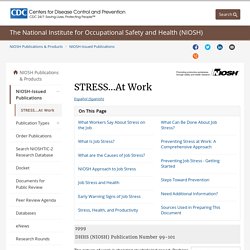
Perhaps now more than ever before, job stress poses a threat to the health of workers and, in turn, to the health organizations. Through its research program in job stress and through educational materials such as this booklet, NIOSH is committed to providing organizations with knowledge to reduce this threat. This publication highlights knowledge about the causes of stress at work and outlines steps that can be taken to prevent job stress. Publication No. 99-101 was prepared by a NIOSH working group: Steven Sauter – Lawrence Murphy – Michael Colligan – Naomi Swanson – Joseph Hurrell, Jr. – Frederick Scharf, Jr. – Raymond Sinclair Paula Grubb – Linda Goldenhar – Toni Alterman – Janet Johnston – Anne Hamilton – Julie Tisdale Stress in Today’s Workplace The longer he waited, the more David worried.
“You got out just in time,” he told her. “Well, I really miss you guys,” she said. What is work-related stress? Effects of Stress. Stress Symptoms: Physical Effects of Stress on the Body. Stress affects us all.

You may notice symptoms of stress when disciplining your kids, during busy times at work, when managing your finances, or when coping with a challenging relationship. Stress is everywhere. And while a little stress is OK -- some stress is actually beneficial -- too much stress can wear you down and make you sick, both mentally and physically. The first step to controlling stress is to know the symptoms of stress.
But recognizing stress symptoms may be harder than you think. What Is Stress? Stress is the body's reaction to harmful situations -- whether they’re real or perceived. Emotional signs of stress. Signs that you are stressed. Detrimental effects of constant stress. How to handle stress at work. If you’re currently working, you probably know what it feels like to be stressed on the job.
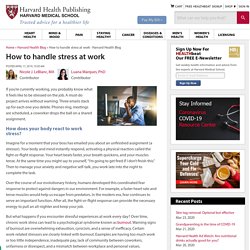
A must-do project arrives without warning. Three emails stack up for each one you delete. Phones ring, meetings are scheduled, a coworker drops the ball on a shared assignment. How does your body react to work stress? Imagine for a moment that your boss has emailed you about an unfinished assignment (a stressor). Over the course of our evolutionary history, humans developed this coordinated fear response to protect against dangers in our environment. Engage in Cognitive behavioural methods. Coping with stress: Workplace tips. Coping with stress: Workplace tips Job stress can be all-consuming — but it doesn't have to be.
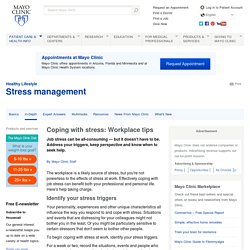
Address your triggers, keep perspective and know when to seek help. By Mayo Clinic Staff. Strategies to cope with overwhelming workload. 10 stress busters. If you're stressed, whether by your job or something more personal, the first step to feeling better is to identify the cause.
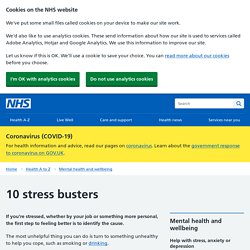
The most unhelpful thing you can do is turn to something unhealthy to help you cope, such as smoking or drinking. "In life, there's always a solution to a problem," says Professor Cary Cooper, an occupational health expert at the University of Lancaster. "Not taking control of the situation and doing nothing will only make your problems worse. " He says the keys to good stress management are building emotional strength, being in control of your situation, having a good social network, and adopting a positive outlook.
Check out our selection of stress-busting apps in the NHS Apps Library. TODAYonline. SINGAPORE — Singaporeans are not only sleep deprived, but they are also among the most stressed at work globally, according to a survey by health service company Cigna released on Tuesday (Mar 26).
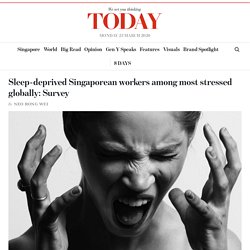
Nearly 92 per cent of Singaporeans surveyed were stressed from work, which was higher than the global average of 84 per cent. Of this group, 13 per cent said that the stress they faced was unmanageable. Singaporeans’ physical wellness index also dipped by 4.4 percentage points from last year, which the survey attributed to an increase in sleepless nights. Of the 23 markets surveyed, Singapore had the fifth lowest wellness index, which was measured across five key indices — family, financial, physical, social and work. Singapore fell by a place from last year as its wellness index went down by 1.7 points to 57.8. Singaporeans are among the most stressed at work, globally. Singaporeans are among the most stressed at work, globally, the 2019 Cigna 360 Well-Being Survey – Well and Beyond has revealed.
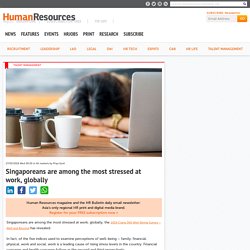
In fact, of the five indices used to examine perceptions of well-being – family, financial, physical, work and social, work is a leading cause of rising stress levels in the country. Financial concerns and health concerns follow as the second and third respectively. A whopping 92% of working Singaporeans are stressed – and women are prioritising families over themselves, study finds, Business Insider - Business Insider Singapore.
Pexels If you’re feeling stressed at work, you’re not alone.
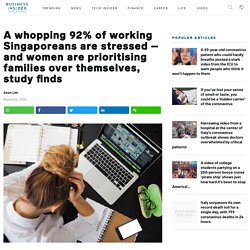
A vast majority of working Singaporeans are under stress, and women in particular feel that it’s less manageable, a survey has found. In the 2019 Cigna 360 Well-Being Survey, a whopping 92 per cent of working Singaporeans report feeling stressed, higher than the global average of 84 per cent. Singapore's most stressed out millennials on working long hours and dealing with anxiety at work. I can't remember the last time I heard a young Singaporean say that they were genuinely excited about the prospect of getting into the office in the morning, even if they were deeply passionate about their field of work.
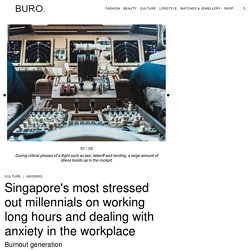
Instead, often times, they expose a toxic work environment where stress and anxiety skyrocket while self-confidence plummets as a result of slave-driving superiors, a overwhelming workload, miserable working hours that extend far beyond the standard 9-to-5 with no reward, and even the possibility of retrenchment in the near future. If all the above sounds a little too dire to be true, you'll only need to look at the findings of the 2019 Cigna Well-Being Survey, which revealed a staggering 92 per cent of of working Singaporeans feel stressed in the workplace with debilitating effects such as lowered morale. If there's one thing I've taken away from their responses, it's that all of us have the ability to manage stress and anxiety.
Coping one day and crying the next: Work-related burnout is real. SINGAPORE: One day at work, Ms Jamuna Raj was striking off “to-dos” from a neat hand-written list, thinking she had a lid on all her tasks at work. But the next day, she was bawling when her boss asked her if she was okay. The 31-year-old, who was handling multiple roles in client management, events, editorial management and production in a small publishing house, did not know what sparked it, but it was the start of her journey towards realising that she was experiencing burnout.
“I was striking the to-dos off, but for every one that I did, there were five more. Still, because I was striking things out, I thought I could handle it,” she told CNA. At the time, she had multiple deadlines looming ahead of her. Her boss had checked on her because she had changed and her colleagues noticed it, said Ms Jamuna, a Singaporean who lives in Melbourne. “As soon as he (her boss) asked me that, I started bawling. READ: Commentary: What’s behind burnout? The Rise Of Workplace Stress In Singapore. Reasons why Singaporeans in the workforce are overly stressed. TODAYonline.
SINGAPORE — Miss Wee Sihui is only 22, but the former retail assistant, who started working full-time early this year, is suffering burnout from work and its accompanying symptoms of feeling constant exhaustion, negativity, dread and pessimism. She used to work in a popular confectionery store and when there was a manpower crunch, she spent around 13 hours on her feet from 9.30am to around 10.30pm daily, juggling responsibilities meant for at least two employees. But it wasn’t just the physically punishing work routine that made her quit her job. Singaporean Workers’ Guide to Stress Management. By providing the information, I/we consent to allow AIA Singapore, its associated persons/organisations, its and their third party service providers and its and their representatives, whether within or outside Singapore (collectively “AIA Persons”) to collect, use, disclose, store, retain and/or process (collectively, “Use”) all personal data and information (“Personal Data”) that had/has been provided to AIA Persons and/or that AIA Persons possess about me/us (whether from me/us or a third party), in the manner and for the purposes described in the AIA Personal Data Policy (“PD Policy”) and which I/we confirm that I/we have read and understood. by electronics transmission to or through my/our *email address(es); and to all my/our *telephone number(s) (of which I/we confirm I am/we are the user(s) and/or subscriber(s), by way of phone/voice call/SMS * which are in AIA Persons’ records as may be updated from time to time by notice to AIA Persons.
Note: Work Stress. Are you suffering from work-related stress? Learn how to recognise the symptoms and manage stress easily. “Work stress” is something that we commonly experience in the workplace. Many of us feel that there is always the pressure for us to improve our work performance and increase our productivity. Work stress often occurs when our capabilities or needs do not meet the requirements of our jobs. Strategies Singaporeans can adopt to cope with work stress.